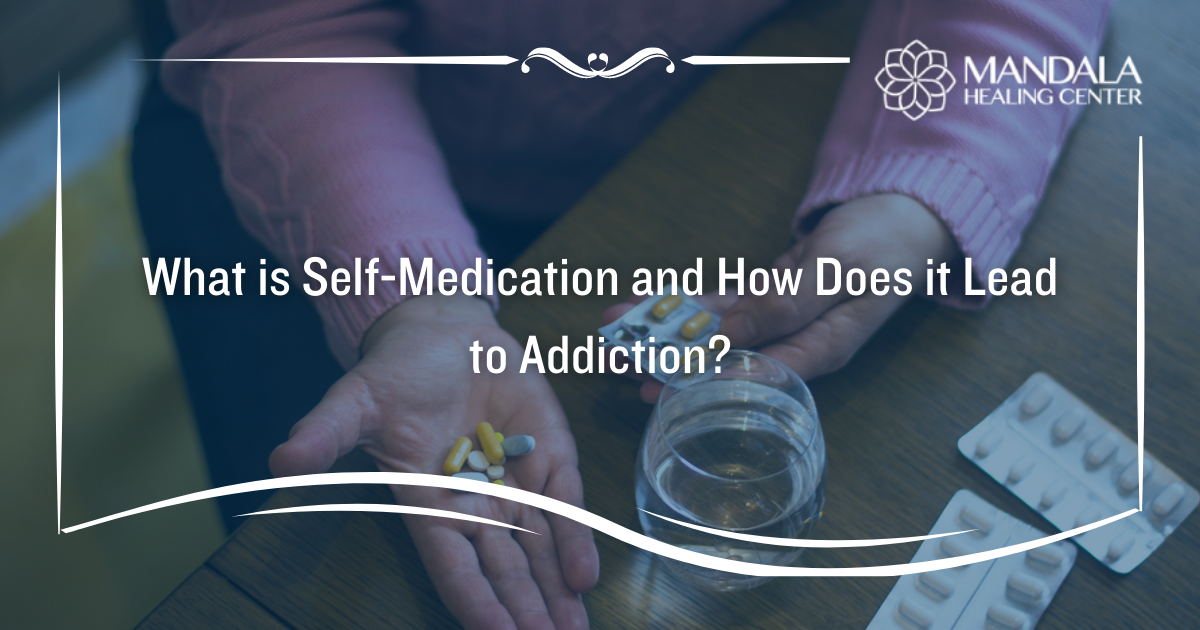Substance abuse and mental health conditions often go hand-in-hand. People with mental illnesses, such as depression, anxiety, bipolar disorder, or physical illness, may turn to drugs and alcohol to manage the symptoms of these conditions. The effects of substances may mask or dull the emotional and physical pain they feel for a short period–but it can also cause serious harm.
When people use drugs or alcohol to cope with the symptoms of a mental illness or emotional pain, it is called self-medication. Self-medication can worsen the symptoms of mental illness, can lead to addiction, and often prevents people from getting the real help they need to manage their symptoms or improve their health.
Recognizing the signs of self-medication is essential so that you can seek the treatment you need to manage your substance abuse and mental illness. Contact the caring specialists at the Mandala Healing Center for information about our supportive, comprehensive treatment programs.
Understanding the Causes of Self-Medication
In the United States, about 7.7 million people live with mental illness and substance use disorder.
Self-medication means using drugs or alcohol to cope with the uncomfortable symptoms of a mental or physical health condition. Some people who self-medicate have a formal diagnosis of a medical issue or mental illness. Some common conditions linked with self-medication include:
- Cancer
- Chronic pain
- Injury
- Depression
- Anxiety
- Schizophrenia
- Bipolar disorder
A person does not have to have a formal medical or mental health diagnosis to engage in self-medication. People may use drugs and alcohol to manage temporary emotional or physical discomfort–and this can lead to the development of a substance use disorder.
There are two core reasons someone may self-medicate. These are:
- To make the symptoms of a stressor, including a mental or physical illness, seem more manageable.
- Because they do not have the coping skills they need to cope with their physical or emotional discomfort.
For some, substance use provides temporary relief from the pain they do not feel equipped to cope with–but this comes at a cost and leads to more significant problems.
Mental Health and Self-Medication: The Numbers
About 38% of all people diagnosed with a substance use disorder also have a diagnosed mental illness. People may turn to drugs and alcohol for relief or comfort from their mental health symptoms, but substance abuse can worsen the symptoms of a mental illness.
Research has shown a connection between specific mental health conditions and a likelihood of self-medication. One study found that about 1 in 5 people with an anxiety disorder engaged in self-medication. Another discovered that about 23% of people with depression and 41% of people with Bipolar (Type 1) used drugs and alcohol to manage their symptoms.
Trauma, grief, and stress are also linked to self-medication. Research found that about 21% of people with Post Traumatic Stress Disorder (PTSD) turned to substances to relieve their symptoms.
Suffering abuse and other trauma can also lead to self-medication, and this risk is significant among adolescents. Teens and young adults with a substance use disorder are three times more likely to have experienced abuse or trauma.
The Dangers of Self-Medication
Our culture often normalizes the practice of using drugs and alcohol to cope with emotional pain or to give your mood a boost. There are plenty of examples of this in popular culture: parents drinking wine to cope with the stress of raising young children, workers going out for a happy hour after a long day, and many more commonplace examples.
But using drugs or alcohol can significantly harm your mental and physical health over time and may lead to an addiction with life-threatening consequences.
Regular, heavy substance use can cause changes to the physical structure and chemical makeup of a person’s brain. Vulnerable people with a predisposition toward mental illness may find symptoms developing or worsening. For example, cocaine use has been linked to worsening symptoms of bipolar disorder, and marijuana use may cause early onset of psychosis.
Self-medication can also interfere with the effective treatment of mental and physical illness. It can prevent people from seeking treatment for health conditions and keeps them from developing healthy coping skills to help them live healthy, productive lives.
Recognizing Self-Medication
Being aware of self-medication is the first step toward getting the help you need. Some of the common symptoms of self-medication include:
- Drinking or using drugs when you feel anxious, depressed, lonely, overwhelmed, or in pain
- Experiencing depression, anxiety, or other emotional discomforts when drinking or using drugs
- Facing social, legal, or financial trouble related to your substance use
- Taking prescription medications differently than prescribed
- Using another person’s prescription drugs
Effective, comprehensive treatment can help you recover from a substance use disorder and learn healthier strategies to cope with physical and emotional pain. Get the help you need as soon as possible to avoid developing a substance use disorder or dependence.
Find Treatment Now
Are you or a loved one engaging in self-medication, and you need help to stop? Reach out to the specialists at the Mandala Healing Center to learn about your treatment options. Compassionate, comprehensive treatment is just a phone call away. Don’t wait for the support you deserve. Call today.












